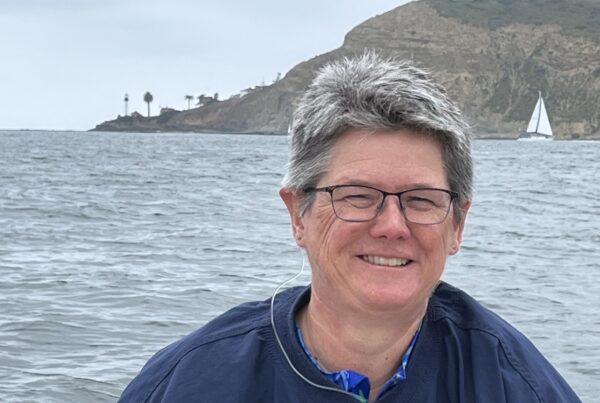T hree years before I wrote The Sacred Pulse, I came home exhausted. I don’t even remember what I had been doing, but I know it was all things I enjoyed. My life was so full. I loved ministry. I loved where I lived. My kids were happy. I was sleeping well at night. I had activities and hobbies that brought me joy. But, on that particular day, I came home from the office and I just felt weary. I told my husband, Jeff, how I was feeling, and he said, “Is it possible you’re just a little out of rhythm?” When he said that, I felt irritated. It’s so annoying when someone else can see things more clearly than you can. I bristled and I resisted, but deep down, I knew he was right.
As I reflected on Jeff’s question, I formulated the basis of my book. I never knew I would be called to write it during a pandemic. I had no idea that while I was writing about holy rhythms, all of my daily rhythms were about to be stripped away. But, as I pondered this frustratingly accurate question Jeff asked me, I realized this: “Even very good activities can become very exhausting activities when we do them to convince ourselves and others that we are worthy of being loved.” Our reason for doing things—our motivation—is a hidden reality that can energize or exhaust us. Are we saying, “Yes” because we are called to do something, or because we are afraid of what will happen if we say, “No”?
There are two passages of Scripture that I’d like to invite you to read as you seek to find what might be missing in your spiritual life: Luke 15:1-10 and Exodus 32:7-14. We have two parables about lost things—a sheep and a coin—and part of the story of the Israelites and the golden calf. These stories call us to dig deep and do the work of decluttering our spiritual lives. These stories call us to tell the truth, to root out whatever is harming or hindering our walk with God, and to continually revisit the spaces of our hearts and lives so that we don’t get cluttered up and lose the way again. These passages call us to listen for the sacred pulse, for God’s holy rhythms, and to return to those rhythms again and again so that we can dance with joy and freedom.
Related: Sabbath Rest: How to Keep the Sabbath Holy
Put in the effort of finding
In Luke 15, Jesus tells three parables—the lost coin, the lost sheep, and the lost (prodigal) son—all with the same call to seek out what is lost. These parables are Jesus’s response to the grumbling of the Pharisees and the scribes who said this of Jesus, “This fellow welcomes sinners and eats with them.” Now, before we judge the Pharisees and the scribes too harshly, we need to keep in mind that tax collectors often collected more taxes than were fair, and they had buddied up to the oppressive Roman empire. There was a reason people didn’t like them. And sinners? We’re all sinners, aren’t we? But, imagine if Jesus came into our community and invited people with less-than-stellar reputations to eat with him. We might grumble just like the Pharisees and the scribes did. Why would Jesus choose those people?
Rather than fire back at their complaints with a direct statement, Jesus tells three stories about lost things being found. He invites the grumblers to put themselves in the shoes of either what was lost or the one doing the finding so that they can understand why Jesus chose to spend his time with those the world would rather ignore.
What stands out to me about the lost coin and the lost sheep is the effort put forth to find them. The woman cleans her whole house to find the coin she lost, and the shepherd leaves behind the rest of the sheep to seek out the one that had become separated from the flock. The woman and the shepherd don’t wring their hands and think, “Ugh! How sad that one got away!” and they don’t complain to others, “Can you believe that sheep that wandered off?” or “Can you believe my rotten luck in losing a coin?” They do the work of finding. And that work is hard. It comes with costs. It takes time and takes them away from what they probably wished they could be doing instead. But, their mission is clear: to find what was lost.
Search with intentionality
Today, we are invited to ask ourselves what is lost—in our own lives and in the church. What have we neglected in our spiritual journeys? Who have we left behind? What routines and practices were helpful to us and then fell away—either when everything fell away during COVID, or, as happens often in life, just slipped away a little at a time without much notice?
When the woman lost her coin, she noticed. She was paying attention. And she set to work finding what was lost. Likewise with the shepherd. Now, I don’t have nearly 100 chickens, and we make sure to do a beak count every morning and every evening. Even with the few chickens that we have, sometimes it is hard to tell if every chicken is present as we are counting. I can’t even imagine how difficult that would be with sheep. At least my chickens are all different colors! But the shepherd noticed something was missing, and he went searching.
What’s missing in your life? Or, maybe we should ask who is missing? I can’t answer this question for every person, nor do I have all of the answers for every congregation, but I do know one thing: you never know something is missing unless you stop and take a look. Let us do so with intentionality, being mindful of what we have and of what we have lost so that we might go searching for it.
Related: Biblical Hospitality: Inviting Outsiders to be Family
For the shepherd, he had to go looking through the fields. For the woman, she had to clean her house. She had to declutter and look under things. She had to sift through what she had, and I imagine she had to retrace her steps. But, when she found the coin, she rejoiced. She called her neighbors together and threw a party. What once was lost had now been found!
Seek good direction
The people of Israel hadn’t lost a coin or a sheep, but they had lost their way—and truthfully, I don’t blame them. They had come up out of slavery in Egypt. They had gone through the parted sea while Pharaoh’s army chased after them. They had wandered in the wilderness and felt hungry and thirsty. At times, they thought they would die in the wilderness. And they grumbled.
Moses had gone up onto the mountain to receive the Ten Commandments from the LORD, and while he was up there, the people of Israel grew impatient. They wondered what was taking so long, and they were restless. They knew what to expect from life in Egypt. It was hard, unfair, and unjust, and they were suffering, but better the devil you know than the devil you don’t, as the expression goes.
Here at the foot of the mountain? The people didn’t know what would happen next. They were impatient and probably fearful, and so they asked Aaron to give them some direction. Without Moses to guide them, they were desperate for something else to take his place.
Aaron the priest, and brother of Moses, collected the people’s golden rings and earrings and melted them down to make a golden calf. I always think it is hilarious when Aaron is confronted about what he has done, and he plays innocent by saying, “I don’t know what happened! We put this gold in the fire and a golden calf just randomly came out!”
Don’t lose sight of God
What fascinates me about this story is something that Old Testament professor Rolf Jacobson notes. In his commentary on Exodus 32, he urges the reader to pay attention to the phrase “who brought you up out of the land of Egypt.” It occurs four times in the story. First, it occurs when the people are impatient while Moses is on the mountain. They say to Aaron, “Come, make gods for us, who shall go before us; as for this Moses, the man who brought us up out of the land of Egypt, we do not know what has become of him” (v. 1). And, it’s true that God called Moses to lead the people out of Egypt, but time and again God is referred to as the one who brought the people up out of Egypt.
In response, Aaron makes the golden calf, and he presents it to the people saying, “These are your gods, O Israel, who brought you up out of the land of Egypt!” (v. 4). Oof. I love the way Rolf Jacobson puts it. He writes:
“So what was Aaron’s sin? Traditionally, most interpretations of this story accuse Aaron of making an image of a false god. But that is not really where Aaron went wrong. As indicated by Aaron’s proclamation in verse 5—‘Tomorrow shall be a festival to the Lord’—Aaron’s mistake was to make a false image of the true god.”
While the people are worshiping the golden calf, God says to Moses, “Go down at once! Your people, whom you brought up out of the land of Egypt, have acted perversely” (v. 7). Wait a minute. God is calling Moses the one who brought the people out of Egypt? I think Moses recognized that God was testing him. Verse 11 continues: “But Moses implored the Lord his God, and said, ‘O Lord, why does your wrath burn hot against your people, whom you brought out of the land of Egypt with great power and with a mighty hand?’” Finally, the whole truth comes out. It wasn’t Moses all by himself who brought the people out of Egypt. The golden calf didn’t rescue the people. It was God.
When the people were in Egypt, they had forgotten what it meant to follow after the LORD. They learned a new way of life, but even still God came searching for them. God rescued them and brought them close. Here at the foot of the mountain, the people were losing sight of God again.
Look again for what’s been lost
I came across a video a while back of a sheep that was stuck in a large crack in the ground. All you could see were the sheep’s back legs frantically wiggling. A person came and pulled the sheep out of the crack, and the sheep was so happy that it flailed and jumped and bounced and got stuck in the crack 50 yards from where it had been stuck before.
If we lose a coin, declutter our homes and find it, and then make a mess again, it’s only a matter of time before we lose the coin again, or lose something else. If we lose a sheep, find it, and then don’t take better count of the sheep morning and night, we are going to lose track of them again. The people of Israel, at the foot of that mountain, were losing sight of who God was in their lives. They were straying and grasping for something else, probably because they were afraid. Just like the fearful people of Israel, we lose our way and try to grab onto other things. We fill our lives with so much noise that we don’t hear the sacred song of God any longer.
Every single day, we are invited to go looking again for what’s been lost. Sometimes we do this by examining our own lives, by looking honestly at where we are and where God is calling us to be, and then making changes to get back on track. Sometimes, we’ve strayed so far that we need the help of a friend or trusted person to help us find what’s been lost. I think of Moses coming down the mountain and seeing his brother and all of the people on the wrong track. Those conversations are tough, but sometimes they are necessary.
May God give us the courage to seek out what’s lost, the wisdom to declutter what makes it so easy to lose what’s important, and the joy to celebrate when we find these lost treasures. For truly, God rejoices along with the angels in heaven when even one sinner repents. May it be so with us, and may God help us on our way. Amen.
This article was originally posted on “At the Table with April Fiet.” Adapted and republished with permission.

April Fiet
April Fiet is copastor of First Presbyterian Church of Scottsbluff, Nebraska. April is an integral part of the Reformed Church in America's Women's Transformation and Leadership ministry. She serves on the ministry's guiding coalition, as a theological and social media consultant, and as the main editor of the Building God's Church Together resources. She blogs at At the Table with April Fiet.



